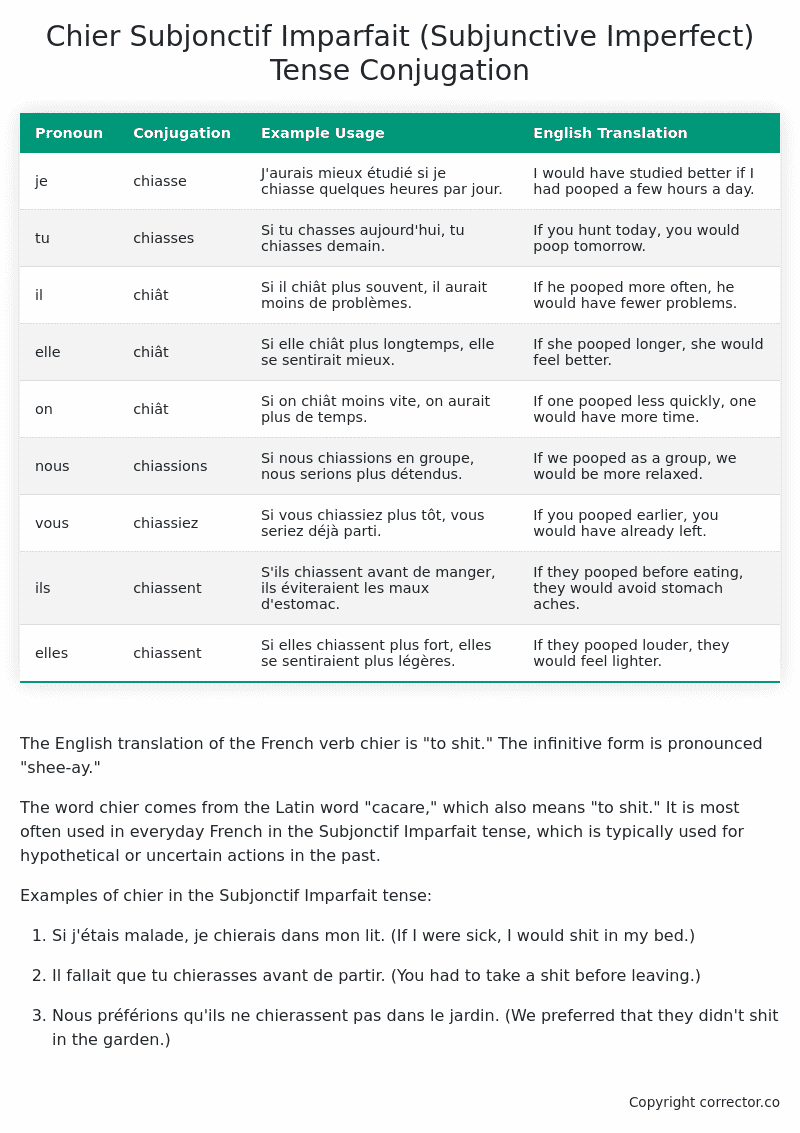Subjonctif Imparfait (Subjunctive Imperfect) Tense Conjugation of the French Verb chier
Introduction to the verb chier
The English translation of the French verb chier is “to shit.” The infinitive form is pronounced “shee-ay.”
The word chier comes from the Latin word “cacare,” which also means “to shit.” It is most often used in everyday French in the Subjonctif Imparfait tense, which is typically used for hypothetical or uncertain actions in the past.
Examples of chier in the Subjonctif Imparfait tense:
-
Si j’étais malade, je chierais dans mon lit. (If I were sick, I would shit in my bed.)
-
Il fallait que tu chierasses avant de partir. (You had to take a shit before leaving.)
-
Nous préférions qu’ils ne chierassent pas dans le jardin. (We preferred that they didn’t shit in the garden.)
Table of the Subjonctif Imparfait (Subjunctive Imperfect) Tense Conjugation of chier
| Pronoun | Conjugation | Example Usage | English Translation |
|---|---|---|---|
| je | chiasse | J’aurais mieux étudié si je chiasse quelques heures par jour. | I would have studied better if I had pooped a few hours a day. |
| tu | chiasses | Si tu chasses aujourd’hui, tu chiasses demain. | If you hunt today, you would poop tomorrow. |
| il | chiât | Si il chiât plus souvent, il aurait moins de problèmes. | If he pooped more often, he would have fewer problems. |
| elle | chiât | Si elle chiât plus longtemps, elle se sentirait mieux. | If she pooped longer, she would feel better. |
| on | chiât | Si on chiât moins vite, on aurait plus de temps. | If one pooped less quickly, one would have more time. |
| nous | chiassions | Si nous chiassions en groupe, nous serions plus détendus. | If we pooped as a group, we would be more relaxed. |
| vous | chiassiez | Si vous chiassiez plus tôt, vous seriez déjà parti. | If you pooped earlier, you would have already left. |
| ils | chiassent | S’ils chiassent avant de manger, ils éviteraient les maux d’estomac. | If they pooped before eating, they would avoid stomach aches. |
| elles | chiassent | Si elles chiassent plus fort, elles se sentiraient plus légères. | If they pooped louder, they would feel lighter. |
Other Conjugations for Chier.
Le Present (Present Tense) Conjugation of the French Verb chier
Imparfait (Imperfect) Tense Conjugation of the French Verb chier
Passé Simple (Simple Past) Tense Conjugation of the French Verb chier
Passé Composé (Present Perfect) Tense Conjugation of the French Verb chier
Futur Simple (Simple Future) Tense Conjugation of the French Verb chier
Futur Proche (Near Future) Tense Conjugation of the French Verb chier
Plus-que-parfait (Pluperfect) Tense Conjugation of the French Verb chier
Passé Antérieur (Past Anterior) Tense Conjugation of the French Verb chier
Futur Antérieur (Future Anterior) Tense Conjugation of the French Verb chier
Subjonctif Présent (Subjunctive Present) Tense Conjugation of the French Verb chier
Subjonctif Passé (Subjunctive Past) Tense Conjugation of the French Verb chier
Subjonctif Imparfait (Subjunctive Imperfect) Tense Conjugation of the French Verb chier (this article)
Subjonctif Plus-que-parfait (Subjunctive Pluperfect) Tense Conjugation of the French Verb chier
Conditionnel Présent (Conditional Present) Tense Conjugation of the French Verb chier
Conditionnel Passé (Conditional Past) Tense Conjugation of the French Verb chier
L’impératif Présent (Imperative Present) Tense Conjugation of the French Verb chier
L’infinitif Présent (Infinitive Present) Tense Conjugation of the French Verb chier
Struggling with French verbs or the language in general? Why not use our free French Grammar Checker – no registration required!
Get a FREE Download Study Sheet of this Conjugation 🔥
Simply right click the image below, click “save image” and get your free reference for the chier Subjonctif Imparfait tense conjugation!

Chier – About the French Subjonctif Imparfait (Subjunctive Imperfect) Tense
Formation
Common Everyday Usage Patterns
Interactions with Other Tenses
Subjonctif Présent
Indicatif Passé Composé
Conditional
Conditional Perfect
Summary
I hope you enjoyed this article on the verb chier. Still in a learning mood? Check out another TOTALLY random French verb conjugation!


